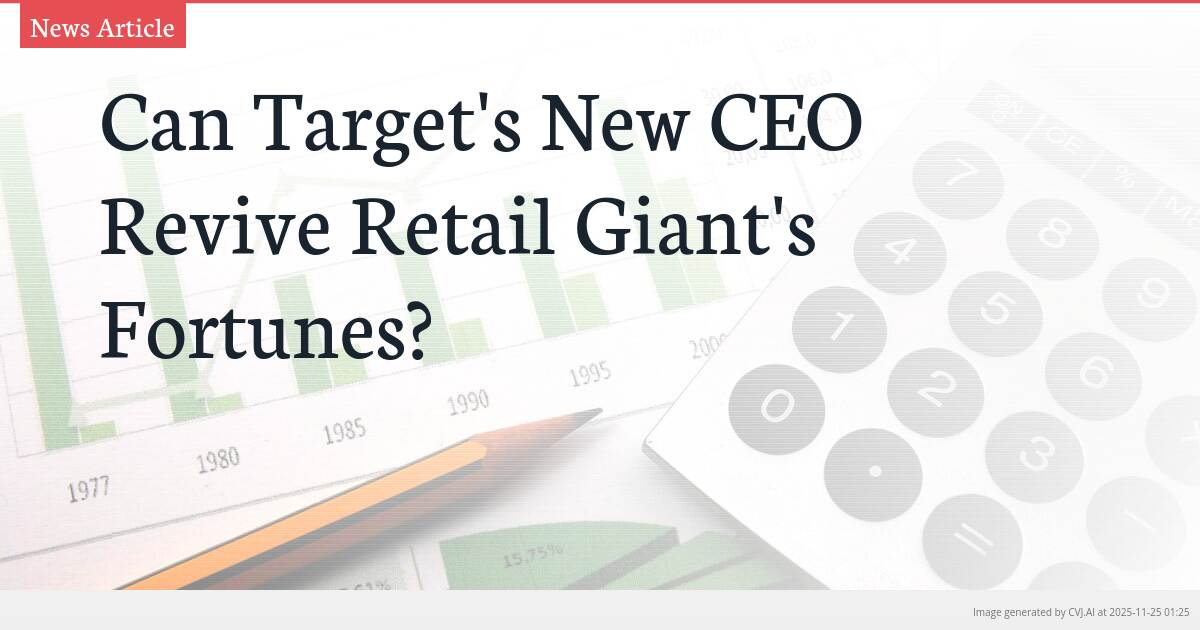Introduction
Target faces mounting challenges as sales and profits continue to decline despite remaining profitable. The retail giant’s new CEO Michael Fiddelke inherits a company struggling with cultural complacency and market evolution. Industry observers question whether the 22-year company veteran can lead the necessary transformation to restore growth and competitive edge in an increasingly challenging retail landscape.
Key Points
- Target reported consecutive quarterly declines in both sales and profits compared to previous year results
- Company culture described as having 'high self-regard' potentially slowing necessary adaptation to retail industry changes
- New CEO Michael Fiddelke promoted from within after 22 years with company, raising questions about fresh perspective needed for turnaround
Persistent Decline Amidst Retail Transformation
Target Corporation, once a darling of the retail sector, finds itself in a troubling pattern of consecutive quarterly declines. In November, the company confirmed during an earnings call that both sales and profits had fallen yet again compared to the previous year, marking a concerning trend for the nearly 2,000-store retail chain. Despite maintaining profitability and moving substantial volumes of merchandise, the persistent downward trajectory has raised alarms among investors, shareholders, and employees alike.
The retail industry’s rapid evolution has exposed vulnerabilities in Target’s operational model. While the company’s physical footprint remains impressive and its brand recognition substantial, the competitive landscape has shifted dramatically. The challenge facing Target isn’t merely about maintaining store operations but adapting to consumer preferences that increasingly favor seamless digital integration, personalized experiences, and value-driven propositions. The consecutive declines suggest that Target’s current strategy may be misaligned with market demands.
Cultural Complacency and Lack of Urgency
Industry observers point to Target’s internal culture as a potential contributor to its current difficulties. The company has long been described as having a ‘culture of high self-regard,’ which some analysts believe has created dangerous complacency in an industry where agility and rapid adaptation are essential for survival. This cultural dynamic may explain what critics perceive as a lack of urgency in addressing the company’s mounting challenges.
Bloomberg Businessweek Senior Global Business Writer Devin Leonard, who discussed the situation on Bloomberg Businessweek Daily with hosts Carol Massar and Tim Stenovec, highlighted how this cultural factor could be hindering Target’s ability to respond effectively to market pressures. The contrast between Target’s self-perception and its actual market performance creates a critical gap that new leadership must address. This cultural challenge represents perhaps the most significant obstacle to meaningful transformation, as it affects decision-making processes, innovation adoption, and competitive positioning.
The Fiddelke Factor: Internal Promotion or Needed Change?
The appointment of Michael Fiddelke as Target’s new CEO presents a complex leadership scenario. As a 22-year company veteran and senior member of the executive team that presided over the company’s recent decline, Fiddelke brings deep institutional knowledge but also raises questions about whether an internal promotion can deliver the fresh perspective needed for meaningful turnaround. His extensive tenure means he understands Target’s operations intimately but also suggests he may be deeply embedded in the very culture that some observers criticize.
The central question facing stakeholders is whether Fiddelke can make Target ‘cool again’—a challenge that extends beyond mere marketing to fundamental operational and strategic reinvention. His leadership will be tested on multiple fronts: reversing sales declines, restoring investor confidence, motivating employees, and repositioning the brand in a crowded retail marketplace. The fact that he was part of the leadership team during the company’s downturn means he bears some responsibility for current challenges, but also positions him to understand exactly what needs fixing.
Success for Fiddelke will require balancing respect for Target’s heritage with willingness to implement potentially disruptive changes. The retail landscape demands innovation in digital capabilities, supply chain optimization, and customer engagement strategies. Whether a long-tenured insider can drive the level of transformation needed remains an open question that will determine Target’s future trajectory and competitive viability in the evolving retail sector.
📎 Source reference: bloomberg.com

